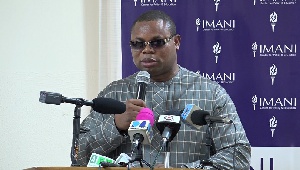 Franklin Cudjoe is President of IMANI Ghana
Franklin Cudjoe is President of IMANI Ghana
IMANI Ghana, a think-tank organization that applies independent critical analysis to policies and other pertinent issues across various disciplines affecting the Ghanaian economy has held a stakeholders’ forum on finding the balance between trade facilitation and revenue mobilization in the Ghanaian trade and maritime landscape.
The President of IMANI Ghana, Franklin Cudjoe said the forum is an honest, open and high-level platform for stakeholders to discuss and suggest practical solutions to emerging factors and challenges affecting port efficiency and revenue mobilization in Ghana.
“I am very positive that this gathering will have very interesting conversations that are solutions driven,” he opined.
The forum, which brought together major players and participants in Ghana’s trade and maritime sector, delved into the two critical issues, Paperless Port and Cargo Tracking Notes that are being implemented.
In the first session bordering on CTN, representatives from the major stakeholder institutions levelled up their arguments for or against the implementation of the CTN policy with trade facilitation and revenue mobilization in focus.
The President of GIFF, Kwabena Ofosu-Appiah, opposed the popular notion that freight forwarders are resisting the implementation of the CTN because it would expose their alleged fraudulent business, but instead raised concerns that customs systems do not integrate with others worldwide among others.
“The trade facilitation agreement, Ghana ratified in 2017. It is now an international treaty. It has certain conditions that you must meet as member. These were some of the questions that we brought to the fore. These were some of the answers that we demanded of these interventions. The answers did not come,” he revealed.
Sampson Asaki, Executive Secretary of the Importers and Exporters Association opined that the CTN is a duplication of the current PAARS under the trade Facilitation Agreement by the Ghana Government.
“The current PAARS has the same tool in place and the current work going on under the trade facilitation agreement of which the parliament of Ghana ratified on the 4th of January 2017,” he said.
CUBAG Secretary, Nicolas Osae, said the CTN policy is an innovative intervention poised to block revenue leakages and create a secure trade chain. He said CUBAG has thought it through and stand by the GRA for its implementation.
“The CTN issue together with the paperless system has come to wipe out waste and plug all loopholes in the clearance system,” he indicated.
A Chief Revenue Officer of the Customs division of GRA, Bismarck Kissi, said CTN has commenced implementation and will undergo much more enhancement per the vision for which it was introduced.
“Once CTN is in, it reemphasizes the TFA and the Custom Valuation Agreement that we have in place,” he said.
However, some stakeholders shared some concerns how the CTN could be improved.
Paperless
On the paperless port, GC-Net, said it has been able to integrate its systems with all relevant institutions to ensure all processes are seamless.
“We are among the first countries in Africa to start the Single Window Missions. We started in 2000 as part of the Gateway project which brought about Ghana Community Network. And as the name indicated, it was supposed to be a community of all people involved in import, so everybody was to be brought on board,” he disclosed.
The representatives of freight forwarders assessed the paperless clearance process as an efficient one saying it has helped improved various aspects of the clearance chain.
President of the Association of Customs House Agents of Ghana, Yaw Kyei urged members of the freight forwarding fraternity to work with integrity to instil trust in the system.
“I must use this opportunity to advice the Freight Forwarders to help cooperate with the system to make it better.”
President of GIFF said, Kwabena Ofosu Appiah said there is a need for a revised governance structure to optimize the paperless process.
A Chief Revenue Officer of the Customs division of GRA, Bismarck Kissi revealed that customs are working intensively to ensure that bottlenecks in the examination processes causing delays are solved.
Overall the general consensus shared was that the paperless port clearance process has been a helpful one.
IMANI promised to put together all inputs on CTN and Paperless as discussed comprehensively to target improvement in trade facilitation in the country.